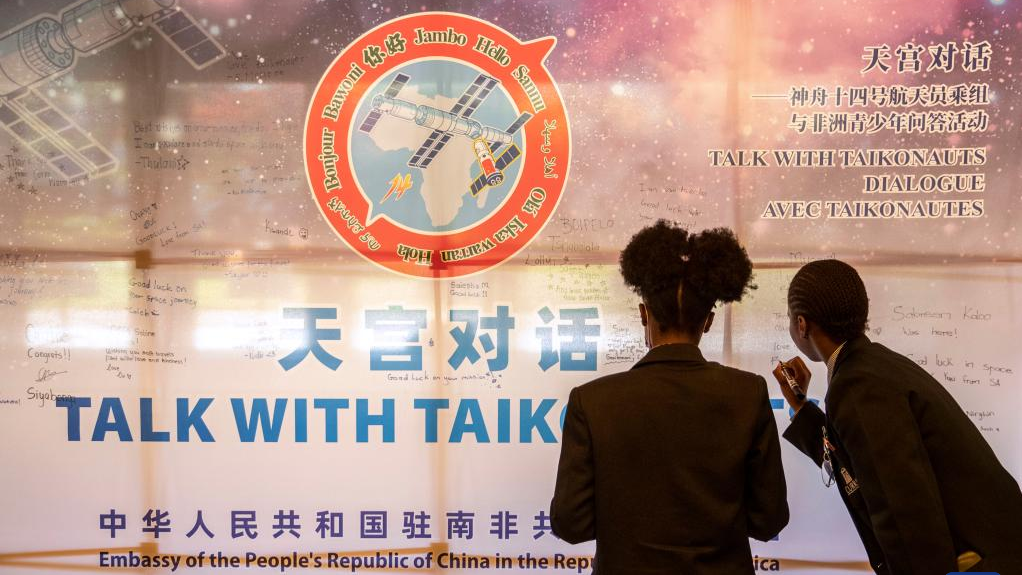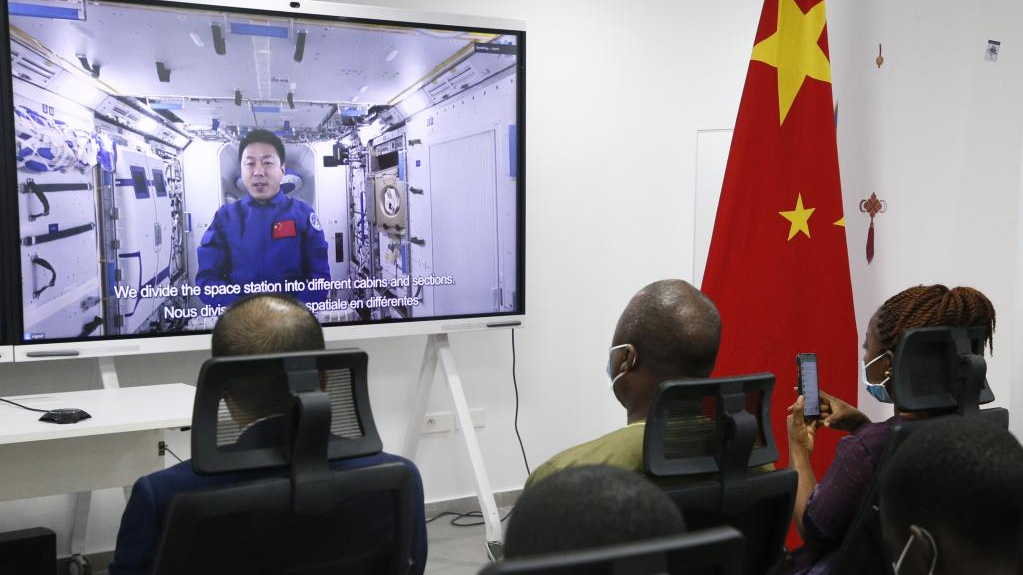
The event "Talk with taikonaut" at the headquarters of the African Union in Addis Ababa, Ethiopia, September 6, 2022. /Xinhua
The event "Talk with taikonaut" at the headquarters of the African Union in Addis Ababa, Ethiopia, September 6, 2022. /Xinhua
Editor's note: Stephen Ndegwa is a Nairobi-based communication expert, a lecturer-scholar at the United States International University-Africa, and an author and international affairs columnist. The article reflects the author's opinions and not necessarily the views of CGTN.
On September 6, three Chinese taikonauts in the China Space Station, Chen Dong, Liu Yang and Cai Xuzhe, shared their thoughts from messages sent by students from eight African countries in an event streamed live from the African Union (AU) headquarters in Addis Ababa, Ethiopia. The seriousness of this event was attested by the fact that it was hosted jointly by the Mission of China to the AU, the China Manned Space Agency (CMS), and the AU Commission.
Such a high level diplomatic engagement for the youth shows that both China and Africa are cognizant of the increasing role this demography is playing in the emerging global scheme of things. It also shows that China is ready to back up its claims of empowering African youth with the right knowledge, attitudes and practices to help them lead in the social and economic transformation of the continent.
The teenage students were drawn from Algeria, Egypt, Ethiopia, Namibia, Nigeria, Senegal, Somalia and South Africa. Most of the discussions centered on the taikonauts' three-month stay in the space station so far, particularly on experiments conducted aboard the space station, life in orbit and their experiences on the first spacewalk.
The dialogue was awe-inspiring, with the African youth curious about how some African landmarks looked like from space. Liu Yang, the first Chinese female astronaut in space, was also a great inspiration to African girls who wanted a reassurance that there was no difference in the work performance between men and women.
The conversation between the Chinese taikonauts and the African youth is in line with China's assertion of the fact that we are living in a world with a shared destiny. The deputy director of CMS, Lin Xiqiang, said that the space station also belongs to the world and "it will be an open platform for people worldwide to explore the universe and conduct scientific research." That gives hope to African youth that although their countries are yet to acquire space technology, they can still partner with China to achieve their dreams of becoming astronauts.
The dialogue marks another milestone in China-Africa cooperation in the space sector, following successful partnerships in areas such as satellite launches, construction of aerospace infrastructure, sharing of satellite resources and joint research and development of satellites. The potential is vast and shows a deep yearning to go deeper and higher in exploring areas of mutual interest.

People watch the event "Talk with Taikonauts" via video link in Abidjan, Côte d'Ivoire, Sept. 6, 2022. /Xinhua
People watch the event "Talk with Taikonauts" via video link in Abidjan, Côte d'Ivoire, Sept. 6, 2022. /Xinhua
Herein lies the bigger picture. Data from the Mo Ibrahim Foundation shows that in 2020, Africa's population was the youngest in the world, with a median age of 19.7 years old. It is estimated that about 60 percent of Africa's population is under the age of 25, with more than a third aged between 15 and 34 years old. It is predicted that the continent will still have the world's youngest population by 2100, with a median age of 35 years old.
This demographic has pent up energy that needs creative release. Space science and technology offers such an outlet or, at least, opens up the possibilities that await African youth who are daring enough to pursue their dreams, both within and outside their countries' borders.
The youth demographics on both sides show the vast current and future potential between both partners. It is imperative that the relevant governments formulate strategies and programs that can bring the youth closer together to exchange ideas and skills, not just for the benefit of their respective countries but also for all youth globally.
Indeed, young people have a very critical role to play in the achievement of the 17 United Nations (UN) Sustainable Development Goals (SDGS). They are the demographic that will either achieve these goals or make them unattainable. Therefore, they should be encouraged to be proactive in participating in the pursuance of the goals. As citizens of developing countries, youth in China and Africa can come up with a common strategy in expressing their views about the kind of world they envisage.
The youth play an integral part in fostering China-Africa relations in various fields including arts, culture, education, entrepreneurship and sports. This cooperation has grown to forums like the China-Africa Youth Federation (CAYF), which was established to provide a platform for communication and friendly consultation among young people from both partners.
The CAYF has become an ideal vehicle for like-minded youth on both sides to explore areas of cooperation, particularly in entrepreneurship. Having more resources and advanced skills, Chinese youth feel a responsibility to their African counterparts in increasing their capacity in areas of cooperation.
By the end of their six-month stay on the Shenzhou-14 mission, the taikonauts intend to undertake many scientific experiments in areas that can add value to humanity. Even though the Chinese taikonauts cannot be categorized in the youth bracket, their dialogue with the African teenagers was extremely motivational and left the youth aspiring to conquer greater heights in both their academic and professional quests.
(If you want to contribute and have specific expertise, please contact us at opinions@cgtn.com. Follow @thouse_opinions on Twitter to discover the latest commentaries on CGTN Opinion Section.)

